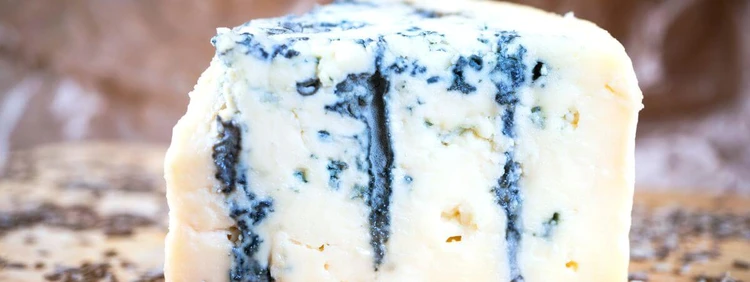Many favorite food items have to be given a wide berth when you’re expecting.
So can you eat blue cheese while pregnant?
Here’s the lowdown.
From salad sprinklings to delicious dips, to mouthwatering melts, blue cheese is at the center of many culinary delights.
Enter pregnancy with all its excitement and magic — and its somewhat truncated list of menu options.
So can you eat blue cheese while pregnant?
Or does it have to go the same way as carpaccio and cocktails?
We’ll take you through the details.
In this article: 📝
- Is blue cheese safe during pregnancy?
- What happens if you eat blue cheese while pregnant?
- Is blue cheese pasteurized?
- Can eating blue cheese cause miscarriage?
- Can you eat brie while pregnant?
- Can you eat blue cheese dressing while pregnant?
Is blue cheese safe during pregnancy?
The short answer is: proceed with caution.
Always read the labels and stay away from cheese that is not pasteurized.
The big concern when it comes to unpasteurized cheese is that it might contain dangerous bacteria that could make you or your baby very sick.
Soft cheeses (including most blue cheeses) are riskier than hard cheeses.
That’s because they have a higher water content and are less acidic, making them a fun place for harmful bacteria to hang out and grow.
When you’re pregnant, you’re more susceptible to foodborne illnesses and more at risk of getting really sick from them.
To avoid the risk of foodborne illnesses, the CDC recommends that pregnant people stay away from soft cheese unless it specifically states on the package that it’s made from pasteurized milk.
The word from the NHS in the UK is a bit stricter, though — no soft cheese, whether pasteurized or not.
What happens if you eat blue cheese while pregnant?
One of the big threats is listeriosis, a serious infection caused by the bacteria listeria.
This condition is quite rare, but you’re twenty times more likely to become infected than a person who is not pregnant.
If you do get this horrible illness, you could pass it on to your baby.
And the risks of pregnancy loss, early labor, and stillbirth go up.
So it’s best to be safe.
It’s also reassuring to know that there is treatment available.
Particularly if it’s found early, getting antibiotics for listeriosis lowers all the risks and means that you may not pass the infection on to your baby.
All cheeses are home to a population of bacteria, yeast, and mold.
And while housing a complex ecosystem of organisms contributes to the flavors that so many of us know and love, it does mean that there are some risks involved.
Luckily, we have a pretty awesome method to kill off harmful bacteria so that we can enjoy dairy products more safely — namely, pasteurization.
The process involves heating milk to a temperature of 161° F, holding it there for about fifteen seconds and then cooling it to a temperature of about 39° F.
By doing this, we seriously stave off the risks of coming into contact with not-so-friendly organisms.
But in order to preserve specific tastes, not all dairy products are made from pasteurized milk.
Is blue cheese pasteurized?
Hate to be the bearer of bad news here, but many blue cheeses are made from unpasteurized milk.
Blue cheese is aged and a lot of harmful bacteria die off in this process.
This makes it generally safer to eat even without pasteurization.
But when you’re pregnant, you should be extra cautious.
Blue cheeses like Roquefort and Gorgonzola are generally unpasteurized.
But some of the harder options, like blue cheese crumbles and Stilton, are often made from pasteurized milk.
It’s always best to check the labels to figure out what to put in your shopping cart.
Another option is to cook your blue cheese before eating it, as this should kill off bad bacteria.
But again, if you want to be totally safe, keep it off the menu until after your baby is born.

Can eating blue cheese cause miscarriage?
Not directly.
But if you do get a serious bacterial infection from eating unpasteurized cheese, it could increase your chances of pregnancy loss.
Know that pregnancy loss is never your fault.
Of course, we want to do everything we can to have a safe pregnancy, but sadly, loss happens, and about 10-20 percent of pregnancies end this way.
It’s time we normalized the conversation.
Join us on Peanut for support.
Nobody should have to go through this alone.
Can you eat brie while pregnant?
If you’re hankering for a blue cheese alternative, you may be wondering about a spot of brie or camembert.
The same rule applies here: hard cheese is a better bet.
And if you have to eat soft cheese, cook it to keep it as safe as possible.
Other soft cheeses to treat with caution while you’re pregnant include queso el fresco, queso blanco, queso panela, mozzarella, burrata, and feta.
Can you eat blue cheese dressing while pregnant?
Many supermarket blue cheese dressings are made from pasteurized milk, so you may be okay here.
But again, it’s important to read the labels, which can be harder to do when you’re at a restaurant or eating at a friend’s home.
And if you want to be super cautious, it’s best to avoid blue cheese dressing for now.
Luckily, most other salad dressings (provided the ingredients are not raw or unpasteurized) are on the list of things you can have.
We know that steering clear of some of your favorite bites when you’re pregnant is not fun.
But there are so many delicious options on the pregnancy menu.
And in no time, you’ll be tucking into sashimi, pâté, and your favorite soft cheeses — and introducing them to the new little person in your life.
All the best!
We’re rooting for you.

